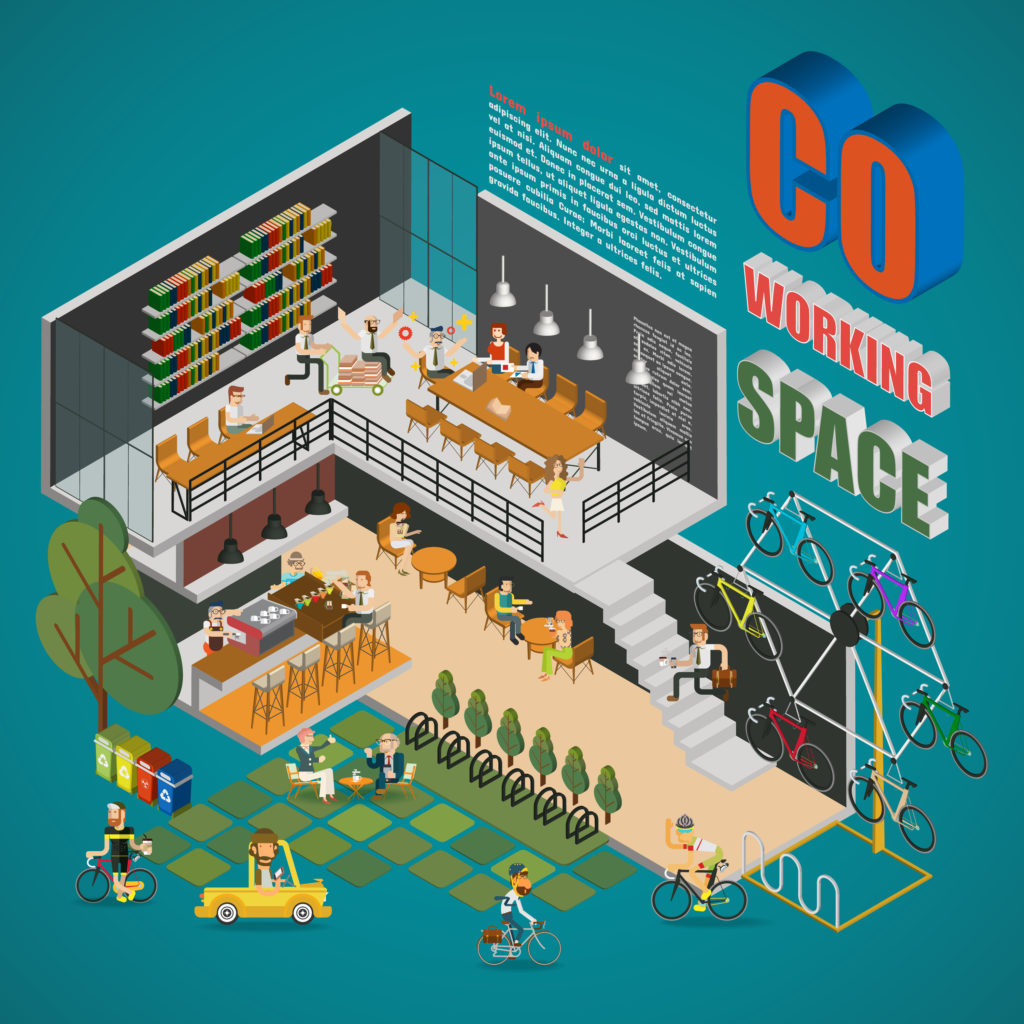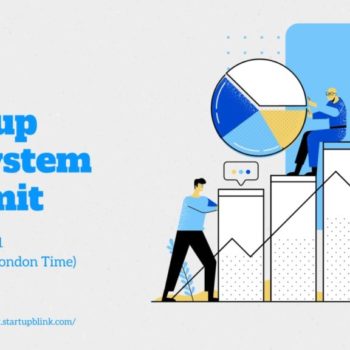Click here to view StartupBlink’s Coworking map
Introduction
With the coworking movement in full swing, there are various options available to choose from. You can choose to work in a local, independent coworking space. Or one that has two or more branches in the same country or city. There are also global coworking spaces such as WeWork and Impact Hub, that are present in many different parts of the world.
In this article, we will discuss the top global coworking chains in the world and the unique advantages each one offers.
Top Global Coworking Chains
While there are several independent coworking spaces all over the world, there are some global coworking chains for the mobile worker of today:
Founded by Miguel McKelvey and Adam Neumann, WeWork is the modern coworking chain valued at a whopping $20 billion valuation. It is present in 399 locations across 78 cities, and you can arrange a free tour and receive up to 15% discount to use their spaces using this link. WeWork’s focus is on building strong networks among its members. And this is something reflected in one of their surveys, that states that 51 per cent of members have done business with each other once a month. The coworking space provides members much more than a physical space: networking events, applications, discounts and opportunities to connect with other members through its own mobile app. It works hard at creating a community, rather than just another workspace.
Regus was launched in 1989, back when coworking was not such a widely used term. The first business centre was opened by Mark Dixon. in Belgium. Harsh Lambah, Country Manager, Regus India (@RegusAsia), says, “Regus introduced the concept of smart, flexible working over 25 years ago foreseeing that in the decades to come, the need for specialised and flexible workspaces would increase. Back then, the priorities of a Regus customer were a clean, well run office and receptionists. A shared fax machine was the only technology used back then. Since then, Regus has grown tremendously and today has a presence in 106 countries and as many as 2,600 business centres.”
Regus has gone from being equipped with a shared laser fax machine, to having latest facilities such as Wi-Fi, virtual office, video conferencing, business lounges, board rooms, training rooms, workplace recovery and much more. Its workspaces are used by small businesses as well as corporates. Several of Regus’ clients are Fortune 500 companies, as shared by Lambah. Philippe Canu, Country Manager, Regus Luxembourg (@RegusBlog), tells us, “We have many well-established businesses who use our flexible workspaces as well as our dedicated collaborative-working spaces. Typically this occurs when a large-scale business puts together a dedicated project team across many disciplines and functions and requires them to work in a collaborative and agile way.”
Regus’ biggest USP, says Canu, is its scale and access to a range of spaces at a national and international level, “Our global network of over 2,600 locations in 106 countries, plus our range of formats and services for customers is unrivalled in the industry.”
Impact Hub was first launched as “HUB” in London in 2005. As of today, are 80+ Impact Hubs with over 13,000 members worldwide united in their mission of creating a better future. Some of its locations include San Francisco, Singapore, Johannesburg and Amsterdam. The main objective of Impact Hub is to create local collaborative communities that are bringing about social change. Céline Tykve (@celine_tykve), Chief Storyteller at Impact Hub Zürich (@impacthubzurich ) says, “We are more than a coworking space, we are a community, a movement of changemakers. Being a member of one of our coworking spaces allows you to use all of them around the globe, the coworking time as well as the events.”
Impact Hubs across the world share the core values of collaboration, openness and sustainability. Tykve shares with us some additional benefits Impact Hub offers to entrepreneurs, “Besides offering inspiring coworking spaces, all Impact Hubs around the world offer their members great networking opportunities, events to connect and focused peer-to-peer learning session. We support startups and founders with coaching, funding and help them with finding investors. As for the large corporations in our ecosystem, Impact Hub offers them leadership trainings (to bring the entrepreneurial spirit back into their companies) as well as access to our community of innovators to be close to the newest trends.”
Urban Station (@UrbanStationMX)
Urban Station is a global network of coworking spaces for the new-age mobile worker. It is present in Argentina, Colombia, Mexico and Chile. Apart from standard coworking space requirements such as wi-fi, conference rooms, auditoriums, flexible workspaces, it also packs in other cool amenities such as outdoor terraces and bicycles.
Urban Station understands that working alone is no easy task, and hence its focus is on building a community for all its members. Florencia Faivich, co-founder of Urban Station, shares with us, “Being part of a community is extremely well perceived. We have prepaid cards that they can use in every branch (local and International), we offer free conference and happy hours to contribute to networking, we have an internal chat that members can use and we are launching a discount program with access to health care, bank, hosting, mobile tech and much more to help them not to feel “orphan” for not being part of a corporation . That is very important.”
Florencia also tells us that Urban Station has plans to expand to many other locations, not only in Latin America, but also in Canada and USA.
Spark Lab is based in New York, but has ties with tech and media coworking ecosystem all over the world. Members of Spark Labs can work in their partner coworking spaces in locations such as San Francisco, Paris, Sydney, Tel Aviv, Singapore and Tokyo. The coworking space also helps entrepreneurs get access to all the help they need starting up by introducing them to investors, mentors, and organising events and workshops. Some of their partners globally include Paris Incubateurs, Bootstrap Lab, La Cantine, Welcome City Lab and The Office Pile.
The Coworking Visa (@coworkingmap)
While not a coworking chain, The Coworking Visa is a coworking exchange program that allows members of one space to work from other spaces in the world for three days. Started in 2008, it is a voluntary agreement that coworking spaces anywhere the world can sign up to, and allow members from other coworking spaces to work for free. Members visiting from other coworking spaces have to notify the coworking space in advance, with relevant documents. As of now the program has over 450 member spaces from USA, Canada, Australia, and various other countries in Asia and Europe.
Should you choose an independent coworking space or a global coworking chain?
Now that we’ve talked about top chains, let’s talk about what is better for you: working in an independent coworking space or a global chain. Both global and independent coworking spaces have some unique advantages to offer and your choice will depend on your personal preferences and working style.
A global coworking chain offers standard amenities, no matter where you go. This means you don’t have to waste time getting used to the space; you have access to the same facilities, technology and comfort that you are used to. Additionally, you have access to a large global network of services and startups that you can tap into. This is invaluable for startups and its importance cannot be stressed enough.
But the familiarity that is the trademark of global coworking chains may not work for some. Independent coworking spaces have a unique new experience to offer. Those looking for novelty in their workspace might find this a better option. If you can easily adapt to new spaces, you might want to give independent coworking spaces a chance.
How was your experience working with global and independent coworking spaces? Share your story below!
We would like to thank Harsh Lambah, Country Manager, Regus India (@RegusAsia), Philippe Canu (@phcanu), Country Manager, Regus Luxembourg (@RegusBlog), Céline Tykve (@celine_tykve), Chief Storyteller at Impact Hub Zürich (@impacthubzurich) and Florencia Faivich, co-founder of Urban Station, for sharing their insights with us.





